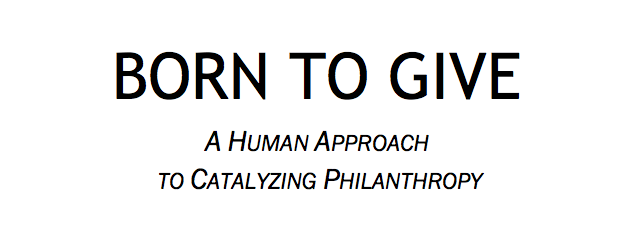
New Nexus white paper “Born to Give: A Human Approach to Catalyzing Philanthropy”
First Posted by Nexus on July 22, 2015 on Nexus Blog
For the past five years, Nexus has bridged communities of wealth and social entrepreneurship and given birth to a movement that has spread all over the globe. Why has it been so successful? To better understand the innovation we have brought to the world and the financial services sector please review our new white paper:
Born to Give: A Human Approach to Catalyzing Philanthropy
There are some big changes coming to the financial services industry. A body of new “affluenza” research, concerning the psychological pitfalls of excessive wealth ownership, has inspired many in the wealth management industry to consider the mental health of their client family offspring for the first time. The studies demonstrate how wealth may isolate people, foster a sense of entitlement and lead to unscrupulous behavior. Many people observe, “Those who waste money, also lose money.”
While banks lose some clients every year, the need to worry about next gen inheritors is greater now than ever before. As baby boomers pass away younger generations are inheriting in greater numbers. And, 90% of inheritors switch financial advisors as soon as they gain control over their money.
This new affluenza research together with an industry wide panic about next gen client retention has created a perfect storm to unite the finance industry and the youth philanthropy movement. If you can prevent affluenza through empathy education, then could you inspire a new wave of giving? A new report titled “Born to Give” explores this question.
In an effort to further promote a greater culture of giving and service, this paper, funded by the Whitman Institute, shines light on the experience of having wealth, the science behind what motivates those to give, and what can be done to support this next-generation of philanthropic leaders.
The paper proposes that, instead of focusing on the technicalities of philanthropy, focusing on the social and emotional development behind philanthropy is the most effective and beneficial approach to not only to promote generosity, but also the well-being of all involved. As Jonah Wittkamper, co-founder of Nexus, says “social movements happen when a group of passionate and visionary leaders come together to make it happen, that is what we are trying to do and what this world needs more of.”
This report shares that while various studies indicate that this next generation of leaders is one of the most culturally diverse, socially collaborative and value-driven groups in history, being a person of wealth often can be an isolating experience. As a result, the sense of connection and social skill development that often fuels giving may be limited for young people of wealth.
Citing research from Dr. Dacher Keltner as University of California-Berkeley, the report explains how such isolation can results in a certain lack of social skills, such as empathy and compassion, which directly interferes with the natural motivations of giving. As Dr. Paul Piff says “if wealth, both socially and psychologically, creates an island that leaves people removed from others, then contributing inroads to that island will trigger these basic empathic processes that would otherwise not be engaged.”
This report explores the science behind this statement, how this relates to the next-gen and specifically philanthropy, and how family members, community members, and service providers can shift the current culture around philanthropy and philanthropists to match the needs and trends expressed by the next generation of influencers.
There are various organizations today, including Nexus, that offer programs and services to support the personal and social development of young philanthropists in order to help them build their communities and, ultimately, their philanthropic impact.
To learn more and to get involved in the conversation contact Katie Greenman at katieg@nexusyouthsummit.org
Read the report.